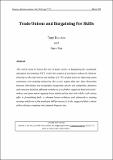| dc.contributor.author | Dundon, Tony | en |
| dc.contributor.author | Eva, David | en |
| dc.date.accessioned | 2011-07-28T10:24:10Z | en |
| dc.date.available | 2011-07-28T10:24:10Z | en |
| dc.date.issued | 1998-03 | en |
| dc.identifier.citation | T. Dundon and D. Eva, 1998, Trade Unions and Bargaining for Skills, Employee Relations, Vol. 20 (1), pp 57-72 | en |
| dc.identifier.uri | http://hdl.handle.net/10379/2091 | en |
| dc.description.abstract | This article seeks to locate the role of trade unions in bargaining for vocational, education and training (VET) within the context of workplace industrial relations. Drawing on the experiences and findings of a TUC project aimed at improving union awareness over training initiatives, the article argues that any clear distinction between distributive and integrative bargaining ignores the complexity, dynamics and variation found at different workplaces. It is further suggested that both policy-makers and government agencies have misplaced the vital role which trade unions offer in formulating both a coherent labour relations and ultimately a training strategy which can utilise employee skill formation. It is also suggested that a review of the voluntary employer-led system is long overdue. | en |
| dc.language.iso | en | en |
| dc.publisher | Employee Relations Journal | en |
| dc.rights | Attribution-NonCommercial-NoDerivs 3.0 Ireland | |
| dc.rights.uri | https://creativecommons.org/licenses/by-nc-nd/3.0/ie/ | |
| dc.subject | trade unions | en |
| dc.subject | collective bargaining | en |
| dc.subject | skills | en |
| dc.subject | Training and development | en |
| dc.subject | J.E. Cairnes School of Business and Economics | en |
| dc.title | Trade Unions and Bargaining For Skills | en |
| dc.type | Article | en |
| dc.identifier.doi | 10.1108/01425459810369832 | en |
| dc.description.peer-reviewed | peer-reviewed | en |
| nui.item.downloads | 894 | |


